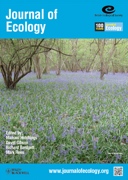Journal of ecology
Abbreviation:
J. Ecol.
Copyright: Blackwell Science Publications
Published by: John Wiley and Sons
Publisher Location: Oxford, England, UK
Journal Website:
http://onlinelibrary.wiley.com/journal/10.1111/(ISSN)1365-2745
Range of citations in the SafetyLit database:
2016; 104(1) --
2016; 104(1)
Publication Date Range:
1913 --
Number of articles from this journal included in the SafetyLit database:
1
(Download all articles from this journal in CSV format.)
pISSN = 0022-0477 | eISSN = 1365-2745
USNLM = 0050202 | OCLC = 50600093
Find a library that holds this journal: http://worldcat.org/issn/00220477
Journal Language(s):
English
Aims and Scope (from publisher):
Journal of Ecology publishes original research papers on all aspects of the ecology of plants (including algae), in both aquatic and terrestrial ecosystems. We do not publish papers concerned solely with cultivated plants and agricultural ecosystems, although manuscripts using such species or systems to address important ecological or evolutionary questions may be considered. Studies of plant communities, populations or individual species are accepted, as well as studies of the interactions between plants and animals, fungi or bacteria, providing they focus on the ecology of the plants.
We aim to bring important work using any ecological approach (including molecular techniques) to a wide international audience and therefore only publish papers with strong and ecological messages that advance our understanding of ecological principles. The research presented must transcend the limits of case studies. Both experimental and theoretical studies are accepted, as are descriptive or historical accounts, although these must offer insights into issues of general interest to ecologists.
